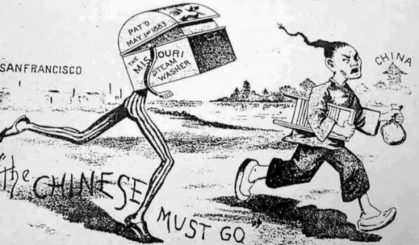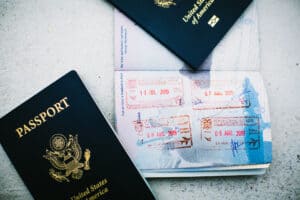
“Burmese army soldiers burned down Christian churches in our villages,” my foster daughter explained when asked about why she had to flee the Chin state of Burma.
Government religious persecution of the Chin people also involved pressing children into forced labor to build roads or act as military porters. Nine out of ten families in the Chin state reported such human rights abuses.
My daughter fled to Malaysia, but when her parents passed away, she became an unaccompanied refugee minor. Through the United Nations, a thorough U.S. State Department vetting process, and the assistance of Christian agencies, she resettled in California.
She was able to complete her high school degree—after having her education interrupted for three years—and gain full-time employment. Currently, she’s attending community college and plans to become a social worker so that she can help others.
If President Trump’s executive order banning refugees had been enacted earlier, my church and I would never have had the joy of having my daughter as one of our family.
If President Trump’s executive order banning refugees had been enacted earlier, my church and I would never have had the joy of having her as one of our family. Indeed, refugees—mostly women and children in situations similar to my daughter’s—are no longer welcomed here in the United States.
From Dangerous Rhetoric to Deleterious Policies
My daughter’s story clearly runs counter to the images of refugees and immigrants portrayed by the current Republican administration. Besides cutting refugee resettlement, that same executive order expanded the definition of who may be deported. Even a legal immigrant, such as my daughter, can be deported if “in the judgement of an immigration officer” she poses a public safety risk. In some states, if she forgets her license at home and drives without one, my daughter could be detained and sent back to Burma, where she has no immediate family.
The term “criminal alien” fuels the perception that immigrants are stealing jobs from “real Americans.” Although visas such as the H1-B currently require extensive proof that corporations must first recruit American workers and agree not to displace American workers, this viewpoint continues to be espoused by politicians.
Politicians repeatedly argue that lowering the number of unskilled workers will somehow “improve the quality of American jobs.” But judging immigrants primarily on the basis of their economic utility or criminality fails to see them as God does, as His children and family.
…judging immigrants primarily on the basis of their economic utility or criminality fails to see them as God does, as His children and family.
Many immigrants come to this country to reunite with family, and to work to support their family; cutting immigration violates the sanctity of family.
History Repeated
The use of damning stereotypes to justify harsh, anti-family policies has long been a dangerous pattern, even in biblical times.
When Mordecai was living in exile in Persia, his enemies accused him and fellow Jews of being unassimilable and clannish: “There is a separate race of people…who keep themselves separate from everyone else” (Esther 3:8). Haman, a high official, used this racist charge to call for a policy of ethnic genocide. Only by God’s intervention through Esther were God’s people saved.
Similarly, Romans saw early Christians as cannibalistic (for eating the Body of Christ) and incestuous (for calling each other brother and sister). Given such a characterization, the empire’s widespread persecution of the diasporic Church was easily accepted.
My paternal great-grandfather and his brother came to the United States at the height of anti-Chinese sentiment in the early 1880s. Stereotyping the Chinese as the Yellow Peril, the Workingman’s Party employed the slogan, “The Chinese Must Go!” to help pass the Chinese Exclusion Act of 1882. Christian ministers working with the Chinese were among the few to oppose this racially motivated legislation.
The Geary Act of 1892 extended Chinese exclusion, and required all Chinese to register for certificates of “indubitable proof of legal entry.” Failure to carry this certificate at all times was unforgiving—those caught could be punished with a year of hard labor, followed by deportation.
In 1906, my great-granduncle left his brother in the U.S. due to the harsh political and economic conditions facing Chinese. According to immigration documents, my great-grandfather reported, “the charity people [presumably Christians] helped these people without steamship fare out and sent them back to China.”
Later, when my paternal grandfather married my grandmother from Hong Kong, and brought her home to his parents in San Francisco in 1923, the U.S. Immigration Service detained them at Angel Island for four months. Even though my family had been in the United States for over half a century and my grandfather was a native-born American, he continued to be profiled as a Chinese individual and suspected as an illegal alien. By law, the testimony of two white witnesses was required as “indubitable proof” that my grandfather was indeed American; the word of his Chinese parents or any other Chinese people did not count.
By law, the testimony of two white witnesses was required as “indubitable proof” that my grandfather was indeed American; the word of his Chinese parents or any other Chinese people did not count.
Fortunately, Christian churches again advocated for improved conditions at Angel Island and provided material and legal assistance. Chinese ministers served as the main translators for immigration proceedings, and many Chinese converted as a result of this ministry to immigrants.
My own family suffered from punitive policies in the U.S., but thankfully they also learned that they could trust “the charity people.”
Christian Focus on the Family
Use of stereotypes has thus long been a tactic employed by politicians to justify the implementation of harsh governmental policies.
In response, the church has intervened to serve Jesus among the least of these, time and time again. Christians understand that in God’s eyes, we are “neither Jew nor Greek,” and everyone—including refugees and immigrants—should be treated with dignity and respect.
Support of refugee resettlement and family immigration is one immediate way of following Jesus and focusing on our call to support families. Our own daughter has taught us much about what it means to be on one hand a resident alien of this earth, and on the other hand, a citizen of heaven.
You see, when we see each other as family members, and not as stereotypes, we truly learn to act as children of God.
 Russell Jeung is Asian American Studies Professor at San Francisco State University. He is the author of a spiritual memoir, At Home in Exile: Finding Jesus Among My Ancestors and Refugee Neighbors (Zondervan 2016) which shares what his family’s stories of migration and exile have taught him about faith and justice.
Russell Jeung is Asian American Studies Professor at San Francisco State University. He is the author of a spiritual memoir, At Home in Exile: Finding Jesus Among My Ancestors and Refugee Neighbors (Zondervan 2016) which shares what his family’s stories of migration and exile have taught him about faith and justice.


